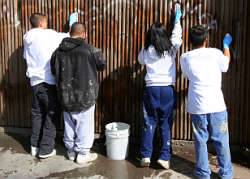Those are just a few of the terms I hear from folks when they talk about their bad church experiences. Granted, I know many who feel very differently about their "church experience," but for those who have opted out of "church-in-a-box," these words feel true. Yet there remains a deep yearning in all of us to connect with others and be a part of something bigger than we are — to be part of a place where God is present and their presence is important to the group.
Jesus promised that when we meet together in community — even in very small numbers — he is present (Matthew 18:20). Yet very few have taken time to look at the radical community the Lord describes and says is crucial for our walk with God. We have a tendency in our politically correct climate to neglect this call. Maybe it's because of the harsh and vivid images. Things like ...
- putting a donkey-sized millstone around our neck and being thrown into the sea (Matthew 18:6)
- gouging out our eyes or cutting off our hands if they lead us to sin (Matthew 18:7-9)
- being thrown into the fires of Gehenna (Matthew 18:8-9)
- being handed over to the officer of torture in a prison (Matthew 18:34)
Jesus is using a common rhetorical device called hyperbole. But don't read that as meaning exaggeration: Jesus is using shocking language to communicate the urgency and importance of the message he is sharing. He wants to shock us into listening. And as I have wrestled with this chapter this past week, I have felt like I have lived through one of those old movies of a nuclear bomb test site — you know, where the atomic winds blow past everything, they dissolve, and then are swept away. I have been convicted, shocked, and challenged. My first response was to ask, "Jesus, why is this so important to you that you use such strong language and such harsh images? Why are you so adamant?"
His answer is clear. We desperately need this kind of community — those outside the church see us as fake and many who have left feel abandoned and neglected. Eternal destinies are at stake and redemptive community is crucial to help all of us through life. We are precious to God — the term that is used here repeatedly is that we are God's "little ones" (Matthew 18:6; Matthew 18:10; Matthew 18:14 — in Matthew, Mark and Luke, the term "little ones" refers to disciples of Jesus and not to physical children.). God doesn't want any of us to be lost or to perish (Matthew 18:14). He wants all of us to find community ... and his presence.
Unfortunately, churches often toss around family language and the close language of community to talk about themselves. Yet all too frequently, these words do not have the substance to back up the talk. People feel cheated and lied to when they realize the language isn't real!
The good news, however, is that community can be real. And when it is, Jesus is present. Those who have experienced genuine community know this is true. And for those who don't believe they have ever had this kind of experience, Jesus lays out four principles for radical and genuine community:
- I have to be accountable for my actions and my influence (Matthew 18:6-9). While I will have to face God for the things I have done while on earth, the issue Jesus is talking about here is the sin we commit that causes others to stumble and sin through our influence. I have to be willing to be responsible for the influence of my own sin. Living in community does mean we take into consideration the impact of what we do on those around us!
- I have to reach out and rescue those in trouble (Matthew 18:10-14). Like a shepherd that goes in search of his lost sheep, I must be willing to go out and find those who are part of my community that I know are in trouble (James 5:19-20). In community, I am my brother's (or sisters') keeper!
- I have to hold those who sin accountable and work to redeem them (Matthew 18:15-20). These may be some of the most ignored verses in the Bible. Jesus makes clear, rather than gossip about someone or condemn them in some other way, I am responsible to go, to help my friend see the error of his or her way.
- I need to forgive those who sin against me, and do so generously from the heart (Matthew 18:21-35). Jesus has forgiven me with great generosity and love; I must do the same with others who have wronged me.
Wow! Strong stuff from Jesus. How do you feel about all of this?
Do you believe we practice these four principles of community very well?
Why are they important for genuine community?
I'd love to get your comments about this and other ideas on community on my blog:
http://thephilfiles.com










Reader Comments
Archived Facebook Comments